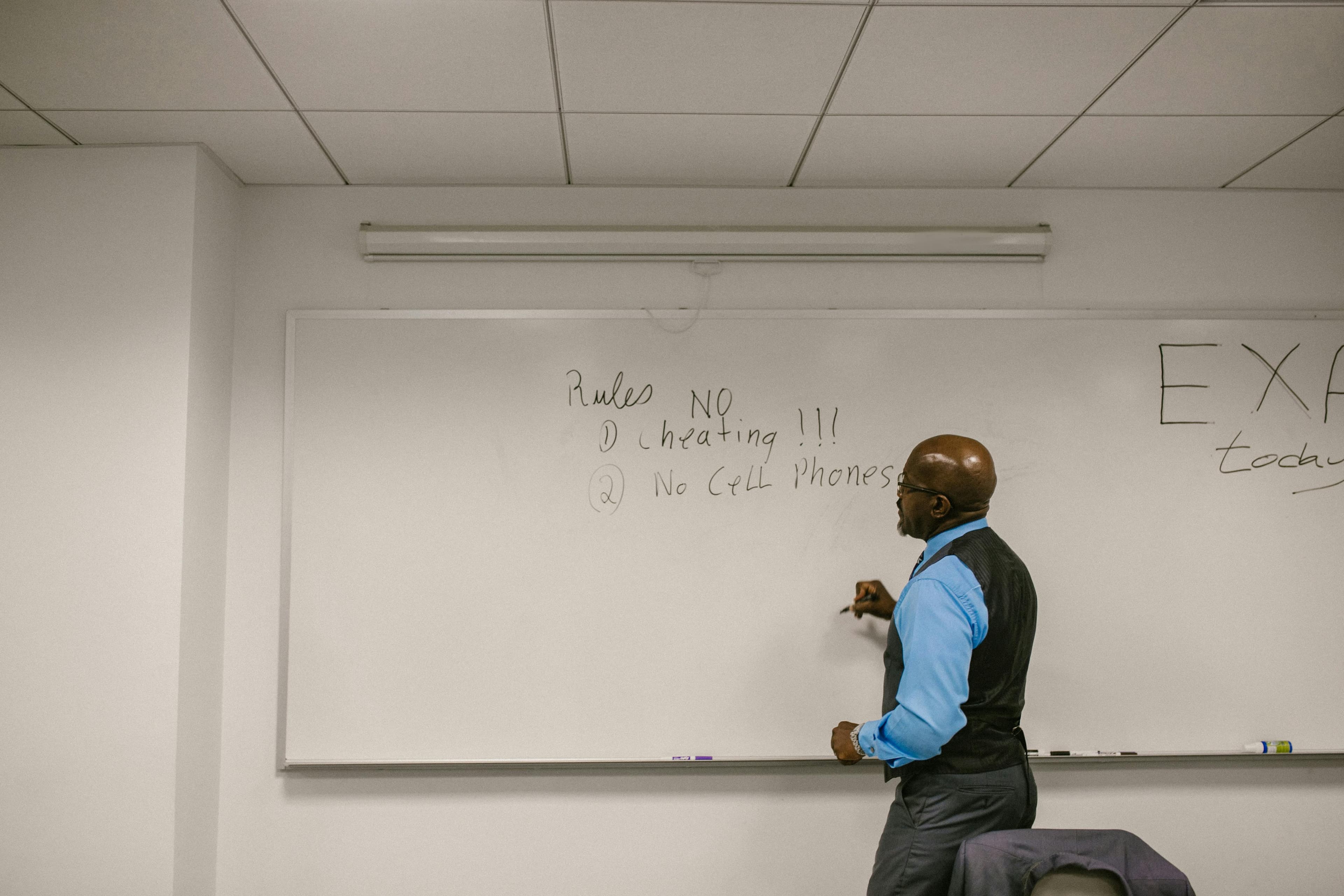MCAT Test Day Tips: What to Bring, Rules & Last‑Minute Advice
10/7/2025 · MCATPrepLab Team · 3 min read
Explore this content with AI:
Get a summary and analysis of this article
Click any AI model to get insights about this content

Photo by RDNE Stock project: https://www.pexels.com/photo/teacher-giving-instructions-not-to-cheat-7092377/
MCAT Test Day Tips
Your months of preparation culminate on one day. A little planning goes a long way toward reducing stress and ensuring there are no surprises. This guide covers what to bring, what the rules are and some last‑minute advice to help you focus on what matters—showing what you know.
The essentials: what to bring
- Government‑issued ID: The AAMC requires you to show an accepted ID matching your registered name when you check in. Make sure your ID is current and meets the exact requirements listed in the MCAT Essentials.
- Food and drinks for breaks: You can store snacks, lunch and beverages in your assigned locker. During scheduled breaks you may access food and medication but not study notes or electronic devices. MedSchoolCoach notes that eyeglasses, personal hygiene items and medicine are allowed in your locker; notes, electronics and visitors are prohibited.
- Comfort items: Dress in layers to handle a chilly or warm testing room. Bring earplugs if allowed by your test center. Pack any medications or necessary personal items (e.g. eyedrops) and remember that cell phones and bags must stay sealed in the locker until the exam is over.
Do not bring
- Calculators, notes or books: The MCAT prohibits calculators and reference materials. A reusable noteboard booklet and marker will be provided for scratch work. Leave extra papers, study notes and textbooks at home.
- Electronics: Cell phones, smartwatches, headphones, earbuds and other electronic devices must remain in your locker. You cannot access them during breaks and will be dismissed if caught using them.
- Visitors: Friends or family cannot accompany you into the testing area.
Test day schedule and procedures
Arrive at least 30 minutes before your appointment. The check‑in process includes identity verification, signing the MCAT Examinee Agreement and a palm vein scan. You will be assigned a seat and given a noteboard booklet. The exam is broken into four sections: Chemical and Physical Foundations of Biological Systems (95 minutes), Critical Analysis and Reasoning Skills (90 minutes), Biological and Biochemical Foundations of Living Systems (95 minutes) and Psychological, Social and Biological Foundations of Behavior (95 minutes). Ten‑minute breaks occur between the first three sections and a 30‑minute lunch follows the second section.
During breaks, you may leave the testing room to eat or use the restroom, but you must return on time. You cannot access your phone or bag during these breaks and cannot study or leave the building. If you finish a section early, use the remaining time for review; you cannot start the next section until the break ends.
Last‑minute advice
- Know the rules: Read the MCAT Essentials and the testing center rules before your exam. The AAMC’s “Top 10 Tips” article recommends familiarising yourself with exam features (highlighting, strikethrough, navigation tools) ahead of time so you are comfortable during the test.
- Pack the night before: Gather your ID, snacks, water, medications and layers. Double‑check that your ID has not expired and that you have directions to the test center.
- Simulate test conditions: Practice using full‑length exams to build stamina and develop a break routine. MedSchoolCoach suggests taking breaks during practice to mirror the timing of the real exam.
- Arrive early and stay calm: Give yourself extra time in case of traffic or unexpected delays. Deep breathing or mindfulness exercises can help you stay focused during the exam.
By following these tips and understanding what you can and cannot bring, you’ll avoid unnecessary stress on test day. The MCAT is long, but a well‑planned approach allows you to conserve energy for what matters most—performing your best.
Featured Articles
Explore more MCAT prep strategies and tips

Can You Take the MCAT Without Studying? What Really Happens
Considering taking the MCAT without studying? Discover why this high‑stakes exam demands preparation and how going in cold can hurt your medical school application.

MCAT for International Students: Eligibility and Strategy
International applicants face unique logistics when taking the MCAT and applying to U.S. medical schools. Learn the eligibility criteria, additional fees and strategies to succeed from abroad.

MCAT Study Plan: How to Create a Schedule That Works
A strategic study plan is essential for MCAT success. Learn how to set a baseline, create a timeline and incorporate active learning and practice exams into your preparation.